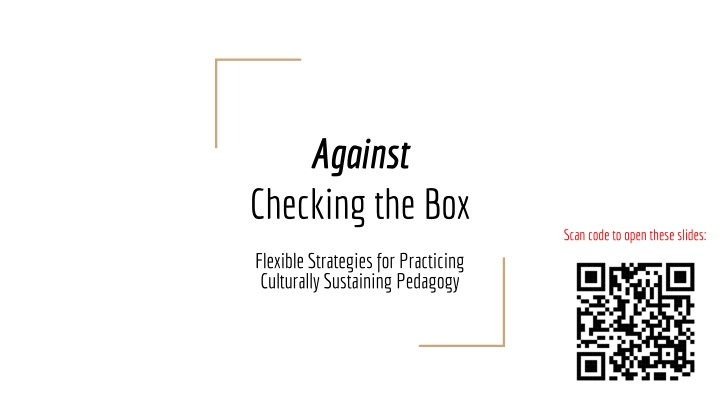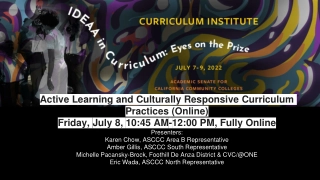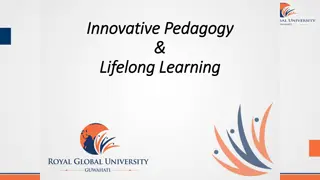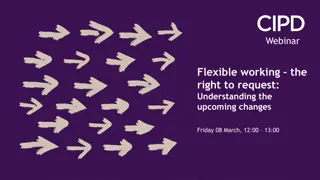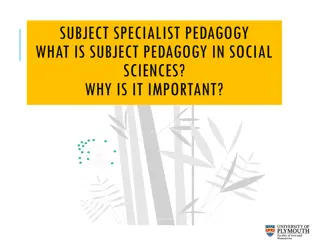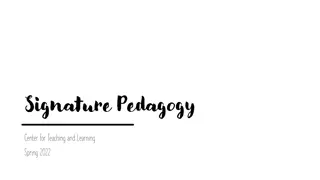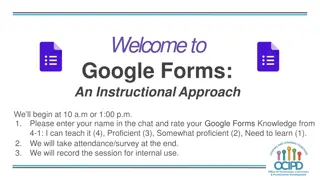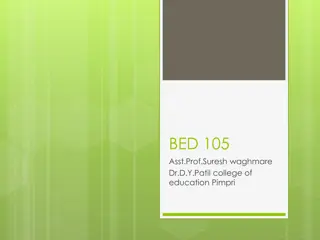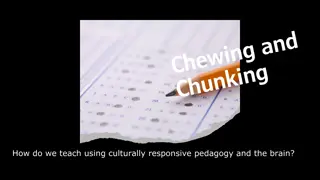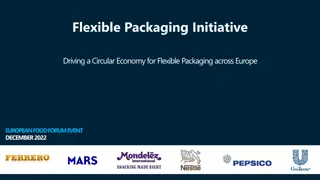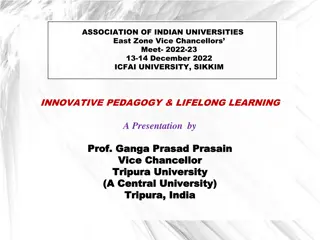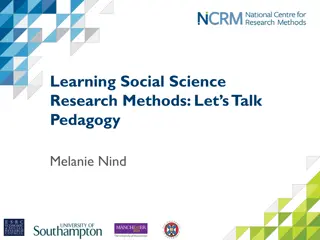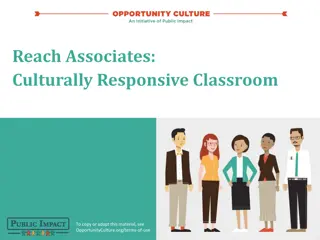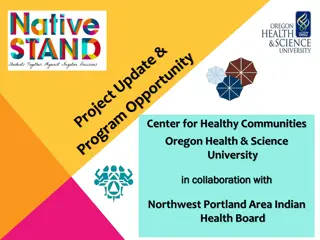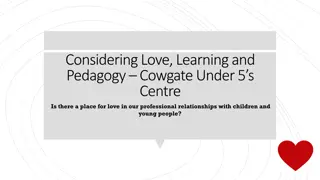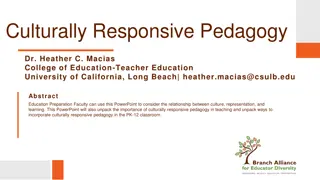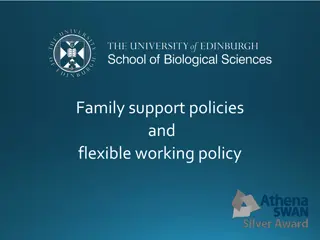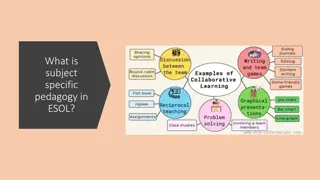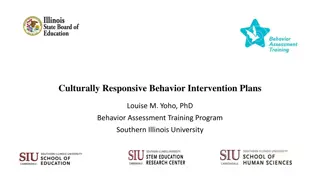Flexible Strategies for Culturally Sustaining Pedagogy
Explore the framework of culturally sustaining pedagogy with an emphasis on supporting multiculturalism, cognitive development, and addressing systemic inequities through collaborative annotation and mini-assessment planning. Learn from renowned scholars such as Dr. Gloria Ladson-Billings and Dr. Django Paris, and delve into key concepts like cultural connectedness, community cultural wealth, and the neuroscience of learning.
Download Presentation

Please find below an Image/Link to download the presentation.
The content on the website is provided AS IS for your information and personal use only. It may not be sold, licensed, or shared on other websites without obtaining consent from the author.If you encounter any issues during the download, it is possible that the publisher has removed the file from their server.
You are allowed to download the files provided on this website for personal or commercial use, subject to the condition that they are used lawfully. All files are the property of their respective owners.
The content on the website is provided AS IS for your information and personal use only. It may not be sold, licensed, or shared on other websites without obtaining consent from the author.
E N D
Presentation Transcript
Against Checking the Box Scan code to open these slides: Flexible Strategies for Practicing Culturally Sustaining Pedagogy
Session Agenda 9:40 Welcome and Session Overview 9:45 Connection: Grounding 9:50 Why Culturally Sustaining Pedagogy? 10:05 A Note About our Pathways 10:10 The Culturally Responsive Scorecard: Collaborative Annotation 10:40 Creating Your Mini-Assessment Plan 11:00 Connection: Sharing
Connection: Grounding Where and/or what are you teaching this academic year? OR What is something that you re looking forward to for the rest of this summer? OR What might you take from this conference that you want to carry with you into the academic year ahead?
The Literature Framework Culturally Relevant Pedagogy Culturally Responsive Pedagogy Culturally Sustaining Pedagogy Dr. Gloria Ladson-Billings, Dr. Luis Moll, et. al. Geneva Gay, Zaretta Hammond, et. al. Dr. Django Paris, H. Samy Alim, Dr. Tara Yosso, et. al. Scholarship Resists deficit thinking, activates critical self-consciousness, affirms cultural identities. Promotes wider multiculturalism, emphasizes cognitive development. Prioritizes ethnic and lingual pluralism, addresses systemic inequities and injustices. Focus Resource Pedagogies, Funds of Knowledge. Cultural Connectedness, Community Cultural Wealth. Key Concepts Rigor, Neuroscience of Learning.
Culturally Sustaining Pedagogy Answer any of these questions! Use what you already know or what you've learned from the quote. -What feels important to you about culturally sustaining pedagogy? Although it is clear that Ladson-Billings (1995) was laying out the ground for maintenance and cultural critique, the term and stance of relevance or responsiveness does little to explicitly support this goal.It is quite possible to be relevant to something or responsive to it without ensuring its continuing presence in a student s repertoires of practice (Guti rrez & Rogoff, 2003), and so its presence in our classrooms and communities. -What do you already know about culturally sustaining pedagogy that you're excited to share with others? I offer the term culturally sustaining pedagogy as an alternative that I believe embodies some of the best past and present research and practice in the resource pedagogy tradition and as a term that supports the value of our multiethnic and multilingual present and future. The term culturally sustaining requires that our pedagogies be more than responsive of or relevant to the cultural experiences and practices of young people it requires that they support young people in sustaining the cultural and linguistic competence of their communities while simultaneously offering access to dominant cultural competence. Culturally sustaining pedagogy, then, has as its explicit goal supporting multilingualism and multiculturalism in practice and perspective for students and teachers. That is, culturally sustaining pedagogy seeks to perpetuate and foster to sustain linguistic, literate, and cultural pluralism as part of the democratic project of schooling. -What questions, confusions, or clarifications do you have? Add your thought to the Padlet Paris, D. (2012). Culturally sustaining pedagogy: A needed change in stance, terminology, and practice. Educational Researcher, 41(3), 93 97.
A Note About Our Pathways Get Good Get Free Frame Binary Liberated Mode Static Active Scope Myopic Forward-Thinking Focus Examining Privilege Dismantling Power Risk Invulnerability Courage and Vulnerability Impact Performative Relational and Authentic Scale Individual Collective
Culturally Responsive Scorecard (SBCTC) Adapted from J. Bryan-Gooden, M. Hester, & L. Q. Peoples. (2023). Culturally Responsive ELA Curriculum Scorecard. New York: Metropolitan Center for Research on Equity and the Transformation of Schools, New York University. Statements Curriculum highlights non-dominant populations and their strengths and assets, so that students of diverse race, class, gender, ability, and sexual orientation can relate and participate fully. The curriculum communicates an asset-based perspective by representing and valuing people of diverse races, classes, genders, abilities and sexual orientations through their strengths, talents and knowledge rather than their perceived flaws or deficiencies. The curriculum does not communicate negativity or hostility toward people of marginalized backgrounds through verbal or nonverbal insults, slights or snubs.*** Curriculum and instructional activities promote or provoke critical questions about the societal status quo. They present points of view from marginalized and systemically non-dominant groups as equally worth valuing. Social Justice Orientation The curriculum recognizes the validity and integrity of knowledge systems based in communities of color, collectivist cultures, matriarchal societies, and non-Christian religions. The curriculum leads with stories and perspectives of marginalized or systemically non-dominant groups and presents different points of view on the same event or experience. The curriculum provides avenues for students to connect learning to social, political, or environmental concerns that affect them and their lives and contribute to change. The curriculum encourages students by providing resources and/or connecting to organizations and movements in order to take actions on issues that affect them and their lives.
Collaborative Annotation Instructions: Follow the link or QR code (see: below right) to access our collaborative Google Doc. Add your comment/s to the document by clicking either Add Comment button (see: below left). Refer to the Metacognitive Bookmark (see: below right) to help craft your comment/s. Click Here to Access Culturally Responsive Scorecard Click Here to Access the Metacognitive Bookmark
Creating Your Mini-Assessment Plan Instructions: Open the Google Doc below and select Make a copy under the File tab. Create an assessment rubric that features what you have reflected on today and want to focus on this fall quarter. There is no wrong way to create your rubric; however, refer to the examples being handed out or at the links below if you like. Click Here to Go to Some Sample Rubric Forms You Can Use to Make a Mini Assessment Plan Two Examples of Mini-Assessment Plans We Created
Connection: Sharing Please feel welcome and supported to share your mini-assessment plan. Please feel welcome and supported to check in with us and/or each other this fall: morgan.owens@seattlecolleges.edu jacob.galfano@gmail.com
